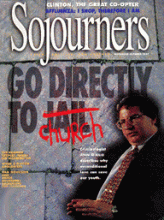The Supreme Court's rejection of the Religious Freedom Restoration Act this summer means that religious individuals and institutions have lost a significant line of defense. We'll see this, for example, when Orthodox Jewish beliefs that don't allow autopsies clash with local laws requiring them. Or when a church seeks to open a soup kitchen and local residents try to use zoning regulations to stop it.
Experts say the potential impact on people of faith is immense. At first it will be most obvious among small or unpopular religious groups and prisoners, for whom the act helped ease access to religious programs or expressions of faith. Oliver Thomas, special counsel to the National Council of Churches, notes the contrast between the courts broad protection of free speech and the narrowing protection of free exercise of religion. "Religion," Thomas said, "has been moved to the back of the constitutional bus."
A controversial "Religious Freedom Amendment" was introduced in Congress last spring, supported mainly by political conservatives and some conservative Christian groups. The amendment is currently being rewritten in the wake of the Supreme Courts ruling. Its authors seek to address what they feel to be too rigid or broad an application of the establishment clause of the First Amendment, which prevents the government from endorsing or co-opting one religion.
If adopted, a religious freedom amendment might allow audible, state-sanctioned prayer in public schools, official placement of religious symbols on government property, and the use of tax money for private religious schools. These are highly controversial possibilities, not only for civil liberties groupswho decry what they see as a lowering of the wall between church and statebut for many faith-based groups as well.
Read the Full Article
